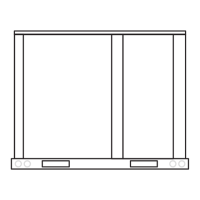Page 35
IV-START-UP - OPERATION
Refer to start-up directions and to the unit wiring diagram
when servicing. See unit nameplate for minimum circuit
ampacity and maximum fuse size.
A-Preliminary and Seasonal Checks
1- Make sure the unit is installed in accordance with the
installation instructions and applicable codes.
2- Inspect all electrical wiring, both field and factory in
stalled for loose connections. Tighten as required. Re
fer to unit diagram located on inside of unit control box
cover.
3- Check to ensure that refrigerant lines are in good con
dition and do not rub against the cabinet or other refrig
erant lines.
4- Check voltage. Voltage must be within the range listed
on the nameplate. If not, consult power company and
have the voltage corrected before starting the unit.
5- Recheck voltage and amp draw with unit running. If
voltage is not within range listed on unit nameplate,
stop unit and consult power company. Refer to unit
nameplate for maximum rated load amps.
6- Inspect and adjust blower belt (see section on Blower
Compartment - Blower Belt Adjustment).
B-Cooling Start-up See figure 23
NOTE-Crankcase heaters must be energized 24 hours be
fore attempting to start compressor. Set thermostat so that
there is no demand to prevent compressor from cycling.
Apply power to unit.
FIGURE 23
REFRIGERANT STAGES -
All-Aluminum Coil
1
2
(BOTH FANS ARE ENERGIZED
WITH A Y1 DEMAND)
CONDENSER COIL
STAGE 1
EVAPORATOR
COIL STAGE 1
EVAPORATOR
COIL STAGE 2
CONDENSER COIL
STAGE 2
B4
B5
1- Initiate first, second or third stage cooling demands ac
cording to instructions provided with thermostat.
2- With 2-stage cooling thermostat, the first-stage ther
mostat demand will energize compressor 1 Full Load.
Second-stage thermostat demand will energize com
pressor 2.
With 3-stage cooling thermostat, the first-stage ther
mostat demand will energize compressor 1 Part Load.
Second-stage thermostat demand will energize com
pressor 2.
Third-stage thermostat demand will energize com
pressor 1 Full Load and Compressor 2
3- Units contain two refrigerant circuits or stages.
4- Each refrigerant circuit is separately charged with re
frigerant. See unit rating plate for correct amount of
charge.
C-Heating Start-up
FOR YOUR SAFETY READ BEFORE LIGHTING
WARNING
Danger of explosion. Can cause injury
or product or property damage. If over
heating occurs or if gas supply fails to
shut off, shut off the manual gas valve
to the appliance before shutting off
electrical supply.
WARNING
Electric shock hazard. Can cause injury
or death. Before attempting to perform
any service or maintenance, turn the
electrical power to unit OFF at
disconnect switch(es). Unit may have
multiple power supplies.
BEFORE LIGHTING smell all around the appliance area for
gas. Be sure to smell next to the floor because some gas is
heavier than air and will settle on the floor.
Use only your hand to push in or turn the gas control knob.
Never use tools. If the knob will not push in or turn by hand,
do not try to repair it, call a qualified service technician.
Force or attempted repair may result in a fire or explosion.
IMPORTANT
Units equipped with a Hot Gas Reheat system MUST
be charged in standard cooling mode.
In case of a safety shutdown, move thermostat switch to
OFF and return the thermostat switch to HEAT to reset igni
tion control.

